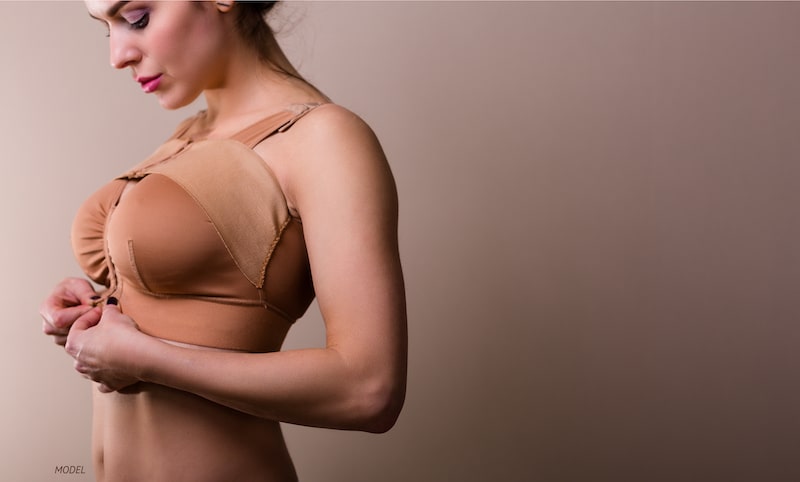Do I Have Capsular Contracture?
Posted March 22, 2022 in Breast Surgery
3 Minute Read:
Breast augmentation is one of the most popular cosmetic surgeries among women in the world, and today, breast implants are far safer than they were when they first became available for breast enhancement surgery.

However, even with their high safety levels, complications can still occur.
Capsular contracture is the most common complication that can arise following augmentation surgery, and it requires breast revision surgery (secondary breast surgery) to correct.
What Are the Symptoms of Capsular Contracture?
Capsular contracture can develop in one or both breasts. This condition can occur in the weeks that follow breast augmentation surgery or can take several years to arise.
Most symptoms of capsular contracture appear gradually and may include:
- Increasing tightness or pain in the breast
- Breast implant(s) that seem to have risen higher on the chest
- Breast implant(s) that are distorted or look rounder, like a sphere — rippling may be evident
- Breast implant(s) that have shrunk and do not move
In about 75 percent of all cases, symptoms begin within the first two years and are often associated with the healing process.
In cases where capsular contracture develops years later (late-onset capsular contracture), the leading cause is an implant rupture. However, this is rare due to the quality of the cohesive silicone gel breast implants used today.
If you find that your breast no longer feels soft or natural and feels hard, you may be experiencing capsular contracture, especially if one or both of your breast(s) have become distorted or you are feeling pain.
The Baker Classification Scale
A modified, four-grade Baker Classification scale is used to classify the signs and symptoms of capsular contracture and determine the degree of the problem.
- Grade I: The breast is soft and appears natural.
- Grade II: The breast is slightly firm but looks natural.
- Grade III: The breast is firmer than before and has an awkward appearance, but there is no pain.
- Grade IV: The breast is significantly harder than before, abnormally shaped, and painful.
How to Avoid Capsular Contracture
While there is no way to entirely prevent capsular contracture, there are potential ways to minimize chances.
First, do not allow just any cosmetic surgeon to perform your breast augmentation surgery. The more reputable your doctor, the less chance you will suffer serious complications of any kind.
It is important to wear any compression garment or bra that your surgeon recommends for as long as they instruct. This has been shown to help prevent capsular contracture.
Lymphatic drainage massage also gives you an advantage and is recommended by the board-certified cosmetic surgeons at Manhattan’s New Look New Life cosmetic surgery practice.
What to Do if You Have Capsular Contracture
If you think you have capsular contracture, call a breast specialist who has experience performing breast revision surgery.
At New Look New Life, we have board-certified cosmetic surgeons who specialize in breast procedures and are committed to providing personal care for our patients.
Breast Revision in Manhattan and Westchester
Learn more about capsular contracture and breast revision in New York City by calling 646-559-2854 or contacting us online—select either the Manhattan office or the Westchester office.
Check out what the American Society of plastic surgeons has to say about capsular contracture.
